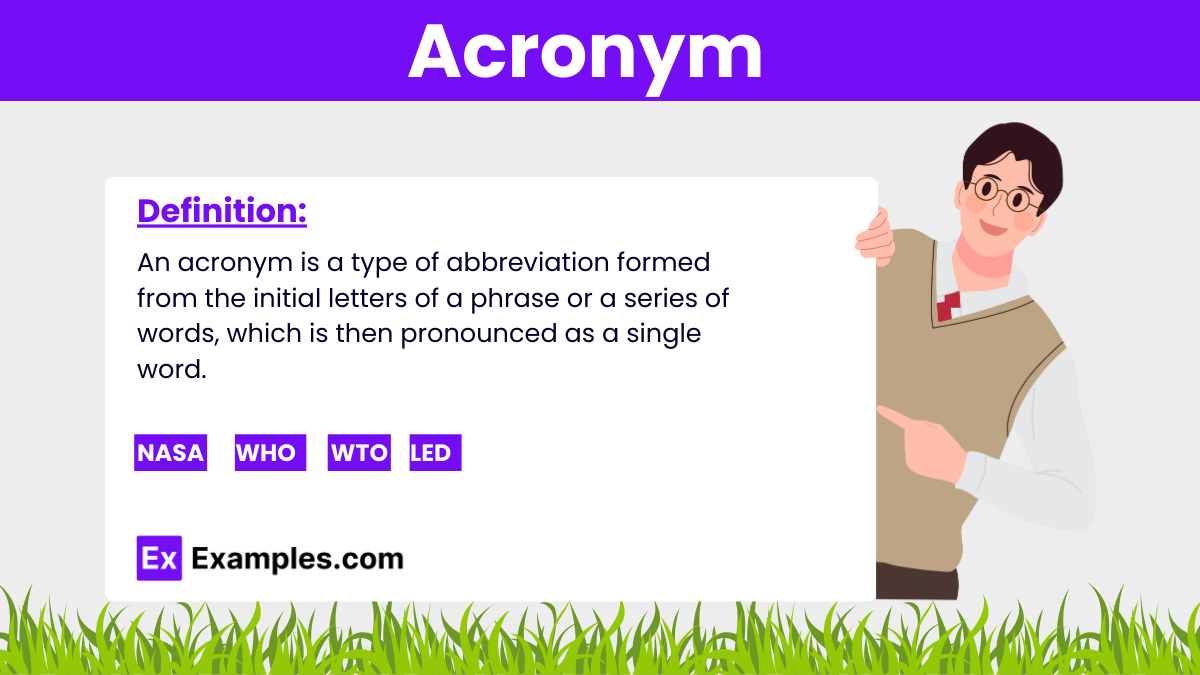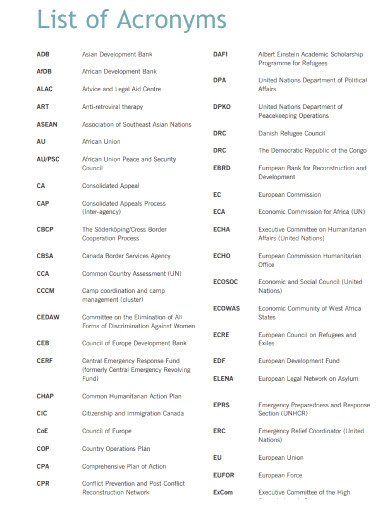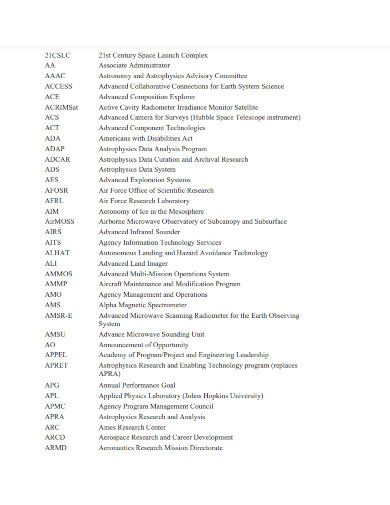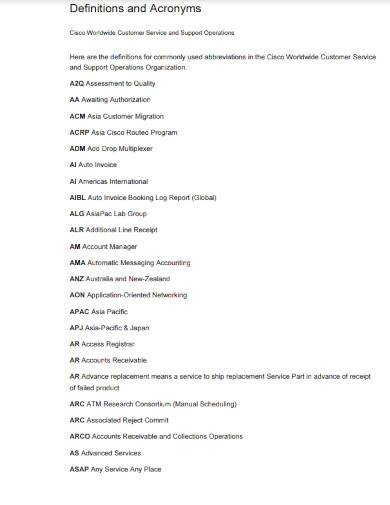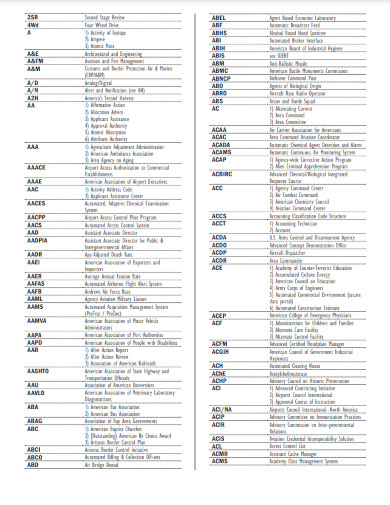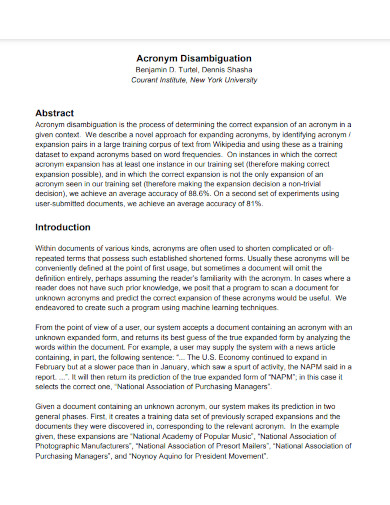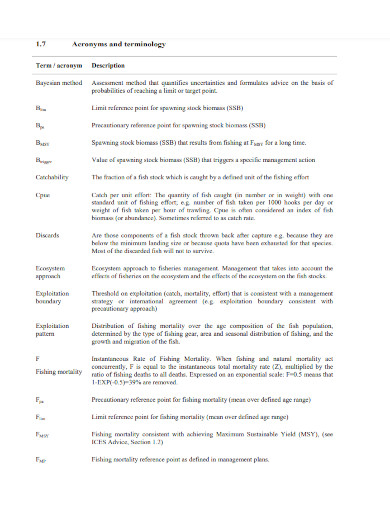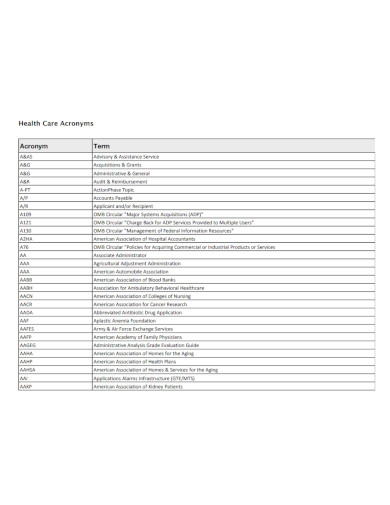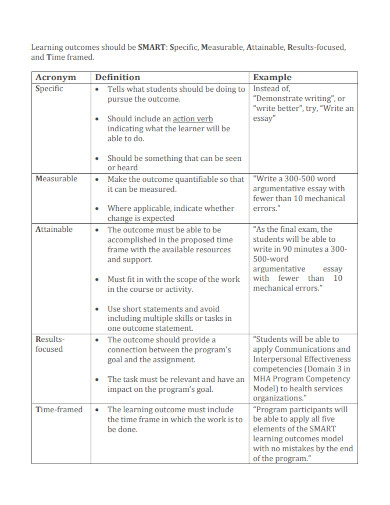90+ Acronym Examples
If you are the type of person who spends their time on the internet, or when you have friends who use these kinds of words like YOLO, ROLF, TTYL, and YGT, you may be wondering what they mean. These words are examples of acronyms and they are common among teenagers and Gen Zen’s.
What is Acronym?
An acronym is a type of abbreviation formed from the initial letters of a phrase or a series of words, which is then pronounced as a single word.Examples include “NASA” (National Aeronautics and Space Administration)
When are acronyms used?
Acronyms are used in various contexts to simplify and expedite communication by reducing lengthy phrases to a few letters. They are particularly prevalent in:
- Professional Settings: Acronyms are used in business, science, and technology to streamline discussions and documentation. For example, “SEO” (Search Engine Optimization) in digital marketing.
- Government and Military: To condense complex titles and operations, such as “NASA” (National Aeronautics and Space Administration) or “NATO” (North Atlantic Treaty Organization).
- Education: Acronyms help in referencing academic degrees and institutions quickly, like “MIT” (Massachusetts Institute of Technology).
- Healthcare: For brevity in medical terms and diagnoses, such as “MRI” (Magnetic Resonance Imaging).
- Everyday Language: Often used to make common expressions or technology-related terms more manageable, like “LOL” (Laugh Out Loud).
Acronym vs. Initialism vs. Abbreviation
| Term | Definition | Examples |
|---|---|---|
| Acronym | A type of abbreviation formed from the initial letters of a series of words, pronounced as a word. | NASA (National Aeronautics and Space Administration) |
| Initialism | An abbreviation consisting of initial letters, each pronounced separately. | FBI (Federal Bureau of Investigation) |
| Abbreviation | A shortened form of a word or phrase. | Dr. (Doctor), approx. (approximately) |
- Acronyms create a new word from the first letters of each word in a phrase, which is spoken as a standalone word, making them easy to say and remember.
- Initialisms are also formed from the first letters of each word in a phrase, but unlike acronyms, you say each letter individually.
- Abbreviations can be the first few letters, a single letter, or a group of letters from one or more words, and they are often followed by a period.
Acronym vs. Abbreviation
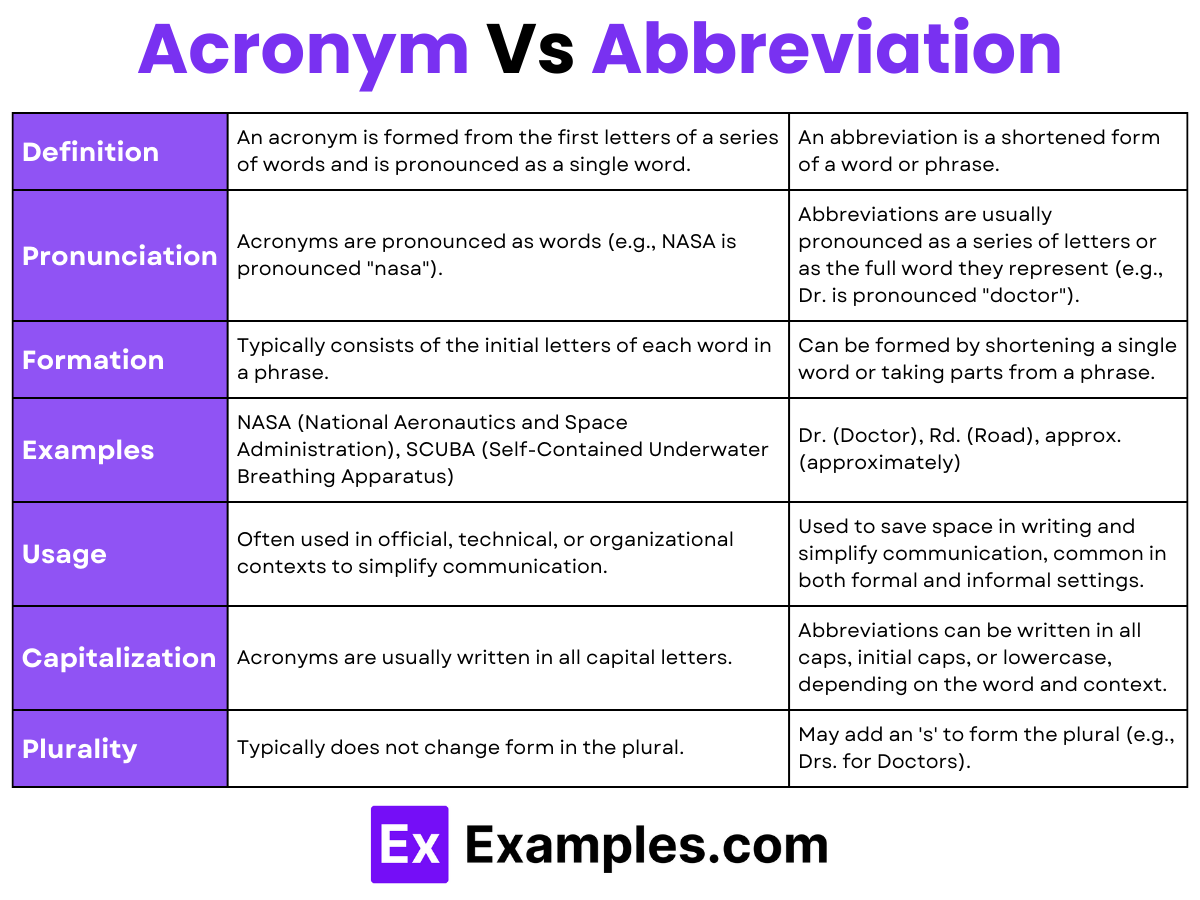
30+ Acronym Examples
- NASA – National Aeronautics and Space Administration
- FBI – Federal Bureau of Investigation
- CIA – Central Intelligence Agency
- NATO – North Atlantic Treaty Organization
- UN – United Nations
- EU – European Union
- WHO – World Health Organization
- ASAP – As Soon As Possible
- PIN – Personal Identification Number
- ATM – Automated Teller Machine
- RAM – Random Access Memory
- HDMI – High-Definition Multimedia Interface
- LED – Light Emitting Diode
- OPEC – Organization of the Petroleum Exporting Countries
- AIDS – Acquired Immune Deficiency Syndrome
- HIV – Human Immunodeficiency Virus
- LGBTQ – Lesbian, Gay, Bisexual, Transgender, and Queer
- RADAR – Radio Detection and Ranging
- SONAR – Sound Navigation and Ranging
- SCUBA – Self-Contained Underwater Breathing Apparatus
- SWAT – Special Weapons and Tactics
- WTO – World Trade Organization
- IMF – International Monetary Fund
- IRS – Internal Revenue Service
- GDP – Gross Domestic Product
- HTML – Hypertext Markup Language
- FAQ – Frequently Asked Questions
- DIY – Do It Yourself
- VIP – Very Important Person
- RSVP – Répondez S’il Vous Plaît (French: Please Respond)
- B2B – Business to Business
- B2C – Business to Consumer
Acronym Examples in Sentence
- NASA is planning a mission to Mars next year.
- I need to finish my ASAP project report for the client.
- FYI, the meeting has been rescheduled to 3 PM.
- The CEO of the company gave an inspiring speech.
- We use HTML to create and design web pages.
- The FBI is investigating the case.
- BTW, don’t forget about the team lunch tomorrow.
- The WHO released new health guidelines today.
- FAQ sections are helpful for finding quick answers.
- My GPS helped me find the shortest route to the destination.
- The UN works towards global peace and security.
- He was sent to the ICU after the accident.
- Wi-Fi is available in all public areas of the hotel.
- The CEO approved the new marketing strategy.
- We need to submit the report before the EOD.
- The company is listed on the NASDAQ stock exchange.
- LOL, that joke was hilarious!
- He is pursuing an MBA at Harvard Business School.
- Please provide your DOB on the application form.
- The IRS requires you to file your taxes by April 15.
Acronym Examples for Students
- GPA: Maintaining a high GPA is important for college applications.
- SAT: She studied hard to achieve a good score on the SAT.
- ASAP: Submit your homework ASAP to avoid penalties.
- PTO: The teacher explained the new PTO policy to parents.
- FYI: FYI, the library closes at 6 PM today.
- PDF: Please submit your project as a PDF file.
- IQ: His IQ test results were impressive.
- STEM: She is interested in pursuing a career in STEM fields.
- P.E.: P.E. class is scheduled for the first period tomorrow.
- R.A.: The R.A. organized a welcome event for new students.
Acronym Examples for Names
- UNICEF: United Nations International Children’s Emergency Fund
- NASA: National Aeronautics and Space Administration
- FBI: Federal Bureau of Investigation
- CIA: Central Intelligence Agency
- NATO: North Atlantic Treaty Organization
- WHO: World Health Organization
- IMF: International Monetary Fund
- IRS: Internal Revenue Service
- EPA: Environmental Protection Agency
- NBA: National Basketball Association
- NFL: National Football League
- OPEC: Organization of the Petroleum Exporting Countries
- WTO: World Trade Organization
- NAACP: National Association for the Advancement of Colored People
- PETA: People for the Ethical Treatment of Animals
- UNESCO: United Nations Educational, Scientific and Cultural Organization
- FDA: Food and Drug Administration
- CDC: Centers for Disease Control and Prevention
- AARP: American Association of Retired Persons
- DHS: Department of Homeland Security
Acronym Examples for School
Here are some acronym examples that are commonly used in a school setting:
- GPA: Grade Point Average
- “Maintaining a high GPA is crucial for college applications.”
- SAT: Scholastic Assessment Test
- “She scored exceptionally well on the SAT.”
- ACT: American College Testing
- “Many students take both the SAT and the ACT.”
- PTO: Parent-Teacher Organization
- “The PTO is organizing a fundraiser for the new playground.”
- IEP: Individualized Education Program
- “The school developed an IEP to support his learning needs.”
- STEM: Science, Technology, Engineering, and Mathematics
- “She is passionate about pursuing a career in STEM fields.”
- ESL: English as a Second Language
- “ESL classes are available for non-native English speakers.”
- PTA: Parent-Teacher Association
- “The PTA meeting is scheduled for next Thursday.”
- PE: Physical Education
- “PE classes are essential for students’ physical development.”
- AP: Advanced Placement
- “She is taking several AP courses this semester.”
- IB: International Baccalaureate
- “The IB program offers a rigorous curriculum for students.”
- R.A.: Resident Assistant
- “The R.A. planned a welcome event for new dorm residents.”
- TA: Teaching Assistant
- “The TA helped grade the exams and assisted with lectures.”
- K-12: Kindergarten through 12th grade
- “The K-12 system covers all primary and secondary education.”
- FAFSA: Free Application for Federal Student Aid
- “Complete the FAFSA to determine your eligibility for financial aid.”
- PDF: Portable Document Format
- “Please submit your assignment as a PDF file.”
- IT: Information Technology
- “The school’s IT department resolved the network issues.”
- ASAP: As Soon As Possible
- “Submit your project ASAP to meet the deadline.”
- R&D: Research and Development
- “The school has a strong focus on R&D in education technology.”
- FYI: For Your Information
- “FYI, the library will be closed for renovations next week.”
More Acronym Examples & Templates
List of Acronyms Example
Shortenings, Blends and Acronyms
Acronyms and Abbrivations Template
Definitions and Acronyms Template
Acronyms Abbreviations &Terms
Acronym Disambiguation Template
Acronyms and Terminology Template
Health Care Acronyms Term
Acronym Definition Example
How to Use Acronyms
Step 1: For a Good Business Name
Believe it or not, a famous food brand KFC is a good example of an acronym. It is short for Kentucky Fried Chicken. But who would want to say such a long name, when an abbreviated version is enough? Business names are good examples to use acronyms, as they can get catchy and easy to remember.
Step 2: The Use for Medical Terms
It goes without saying, the use of acronyms in medical terms is part of the norm in the medical field. They use a lot of acronyms for medical terms as it does not waste their time in saying the whole word. It also helps them keep up with all the medical terms they have to know by
Step 3: Gen Zen’s Language
Many Gen Z’s and Gen Alpha use acronyms as a form of their own language. In order for them to fit in with their peers, they use acronyms as a form of language and to be able to understand what the new craze is among their generation.
Step 4: Using Acronyms in Text Messages
It is common to use acronyms in text messages. When you want to use acronyms in a text, understand what you want to say and how you are going to use the acronym. Context, themes, and tone matters. You do not want the other person to misinterpret what you are saying.
What is an acronym?
An acronym is a word formed from the initial letters of a phrase, such as NASA (National Aeronautics and Space Administration).
How is an acronym different from an abbreviation?
An acronym forms a pronounceable word (e.g., NATO), while an abbreviation is a shortened form of words (e.g., Dr. for Doctor).
Can acronyms be lowercase?
Yes, some acronyms like radar (radio detection and ranging) are commonly written in lowercase.
Do all acronyms use only the first letter of each word?
Most do, but some use the initial letters of major words, excluding small words like “and” or “of.”
Are acronyms used in all languages?
Yes, acronyms are used globally, though they may differ according to language and cultural norms.
Can acronyms include numbers?
Yes, acronyms can include numbers, such as 3G (third generation).
How do you pluralize acronyms?
Pluralize acronyms by adding an “s” without an apostrophe, like CPUs (central processing units).
Do acronyms need periods?
Generally, modern acronyms do not use periods, although older styles may include them (e.g., U.S.A.).
Can acronyms become words?
Yes, some acronyms become common words, like “laser” (light amplification by stimulated emission of radiation).
How do acronyms help in communication?
Acronyms simplify communication by shortening complex terms, making them easier to remember and quicker to write.



